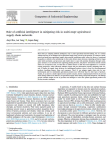Zhu J., Yang L., Feng L. (2025). Role of artificial intelligence in mitigating risk in multi-stage agricultural supply chain networks. Computers & Industrial Engineering, 01/09/2025, vol. 207, p. 111332.
https://doi.org/10.1016/j.cie.2025.111332
https://doi.org/10.1016/j.cie.2025.111332
| Titre : | Role of artificial intelligence in mitigating risk in multi-stage agricultural supply chain networks (2025) |
| Auteurs : | J. Zhu ; L. Yang ; L. Feng |
| Type de document : | Article |
| Dans : | Computers & Industrial Engineering (vol. 207, September 2025) |
| Article en page(s) : | p. 111332 |
| Langues : | Anglais |
| Langues du résumé : | Anglais |
| Catégories : |
Catégories principales 06 - AGRICULTURE. FORÊTS. PÊCHES ; 6.4 - Production Agricole. Système de ProductionThésaurus IAMM SYSTEME DE PRODUCTION ; INTELLIGENCE ARTIFICIELLE ; AIDE A LA DECISION ; CHAINE D'APPROVISIONNEMENT ; PREVISION |
| Résumé : | More firms are adopting artificial intelligence (AI) to assist agricultural decision-making, but it is unclear whether and how AI can mitigate risk in agricultural supply chain. Driven by this question, we construct a multi-period and multi-layer agricultural supply chain network equilibrium model, where the theory of variational inequalities is utilized as the methodology. In this model, farmers make decisions at planting and harvest stages under yield uncertainty, and processors and retailers have to cope with potential disruptions through contingency measures. AI is introduced into supporting planting decision, and players' interactions and risk cascade effects are incorporated. First, we find that AI enables farmers to shift from short-sightedness to a forward-looking perspective, which effectively stabilizes supply and price fluctuations, thereby mitigating risks. Second, AI makes the supply chain decisions for intertemporal products closer to those for non-intertemporal products, benefiting farmers, firms, and consumers. Third, AI can mitigate supply chain risks for non-intertemporal and low substitutable agricultural products more effectively than for other types of products. Finally, AI can also be a double-edged sword in specific scenarios, but the complementarity between AI and cold chain sharing enhances the efficiency of agricultural supply chains during unexpected disruptions. The findings provide valuable insights for the AI providers and managers to select the optimal agricultural products and develop incentive strategies. |
| Cote : | Réservé lecteur CIHEAM |
| URL / DOI : | https://doi.org/10.1016/j.cie.2025.111332 |







